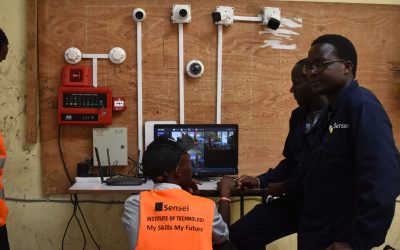Upskilling in Kenya: Building a Future-Ready Workforce

Upskilling has become a cornerstone of Kenya’s workforce transformation, as the country responds to rapid changes in technology, industry, and the global economy. As economies evolve, the demand for skilled, adaptable, and tech-savvy workers has never been higher. In Kenya, this shift is reshaping how we approach education, employment, and career development.
At the heart of this movement is a strategic focus on equipping individuals with new or advanced skills that meet real-time market needs—whether through short courses, technical certifications, digital training, or hands-on vocational programs.
From young school leavers and informal sector workers to professionals and entrepreneurs, Kenyans are embracing upskilling as a powerful pathway to employment, income stability, and economic growth.
From artisans and informal workers to graduates and professionals, Kenyans across all sectors are embracing upskilling as a strategic response to unemployment, automation, and the digital economy.
What is Upskilling?
Upskilling refers to learning new competencies or improving existing ones to stay relevant in a changing job market. Unlike reskilling—which involves training individuals for entirely new jobs—upskilling builds upon a person’s current knowledge base to enhance productivity and career progression.
It often involves:
- Short courses or certifications
- Hands-on technical training
- Digital literacy programs
- On-the-job training
- Soft skills development (e.g., communication, teamwork, leadership)
Why Upskilling Matters in Kenya
1. Youth Unemployment
With over 75% of Kenya’s population under the age of 35, unemployment among youth remains a critical issue. Many graduates find themselves unprepared for real-world jobs due to a mismatch between academic training and market needs. Upskilling bridges this gap by offering practical, employable skills aligned with industry demand.
2. Rise of the Gig and Digital Economy
Digital platforms are creating new opportunities in freelance work, e-commerce, digital marketing, online tutoring, content creation, and more. To fully participate in this economy, individuals need digital skills, financial literacy, and a growth mindset—all of which can be developed through targeted upskilling.
3. Industry Shifts and Automation
Sectors such as manufacturing, agriculture, transport, and energy are undergoing rapid changes due to technology and automation. Upskilling ensures that workers adapt to these shifts by learning how to use modern equipment, software, and sustainable practices.
4. Entrepreneurship and Informal Sector Growth
With over 80% of Kenya’s workforce operating in the informal sector, upskilling in areas like business management, customer service, ICT, and vocational trades can turn small ventures into thriving enterprises and enhance income stability.
Sensei College: Empowering Lives Through Upskilling
At the forefront of Kenya’s upskilling revolution is Sensei College—a nationally recognized institution committed to delivering practical, market-ready skills through a hands-on, student-centered approach.
Sensei College offers a wide array of modular and competency-based training programs that cater to both entry-level learners and experienced workers seeking to improve or diversify their skills. These programs span across:
- Plant Operator and Heavy Machinery Training
- Refrigeration and Air Conditioning
- Electrical Installation and Solar Systems
- Motor Vehicle Mechanics
- Phone and Home Appliance Repairs
- ICT and Computer Literacy
- Defensive Driving and Trailer Operation
- Hairdressing, Fashion Design & Beauty Therapy
Each course is designed with industry input, ensuring that the skills taught align with current labor market needs. Many of these programs are structured in a way that allows for modular progression, making it easier for students to upskill step by step while working or managing other responsibilities.
Sensei College also supports learners with:
- Career guidance and mentorship
- Practical labs and simulation environments
Through partnerships with industry, community organizations, Sensei College is playing a pivotal role in equipping Kenyan youth and workers with the skills needed to succeed in today’s job market.
The Future of Upskilling: Challenges and Opportunities
Challenges:
- Limited awareness and access, especially in rural areas
- Digital divide and lack of internet infrastructure
- Affordability of quality training
- Mismatch between training content and evolving job needs
Opportunities:
- Integration of e-learning and mobile-based training
- Emphasis on lifelong learning and continuous development
- Growth of certification standards recognized by employers
- Stronger industry-academic partnerships to align training with job roles
Conclusion: Upskilling as a National Imperative
Upskilling is no longer a luxury—it is a necessity in today’s dynamic economy. For Kenya to achieve inclusive growth, reduce unemployment, and harness its demographic dividend, strategic investment in upskilling must remain a national priority.
Whether through vocational training, digital literacy, entrepreneurship programs, or on-the-job learning, every skill gained brings us one step closer to a more empowered, productive, and competitive workforce.
With institutions like Sensei College leading the charge, Kenya is well on its way to building a future-ready generation.
Upskilling today is shaping Kenya’s tomorrow.






